Are you ready to dive into the wonderful world of open source CMS?
Think of it as the ultimate digital playground where your ideas swing, slide, and seesaw into reality – without costing you a penny.
Open source CMS software has become a beacon of flexibility, innovation, and community-driven excellence. These platforms make the web development process accessible and affordable, pushing the envelope of what is possible through collaboration and shared knowledge.
We’ll discuss the top open source CMS platforms making waves this year. Whether you’re building your first website or looking to switch up your digital game, there’s something here for everyone.
From the giants everyone’s heard of to the hidden gems waiting to be discovered, we’ll explore what makes each one special.
Let’s find your CMS match!
This post covers:
- The Best Open Source CMS Software
- What Is The Best Open Source CMS?
- Frequently Asked Questions (FAQs)
The Best Open Source CMS Software
Choosing the right open source CMS can make all the difference in your web journey. It’s all about finding that sweet spot where ease meets power—a place where you can express yourself, manage content like a boss, and avoid getting tangled in techy knots.
Think about what matters to you most. Is it the simplicity of a drag-and-drop editor? Maybe it’s the flexibility to grow from a blog to a bustling online store? Or could it be a vibrant community to swap tips with?
For the ultimate experience, look for a CMS with intuitive design, robust features, and the freedom to customize until your heart’s content.
Remember, the best CMS makes you say, “Yep, that’s my kind of tool!”
And in the list below, we included something for everyone. Let’s GO!
Note: You might also like to check our extensive CMS market share statistics.
1. WordPress
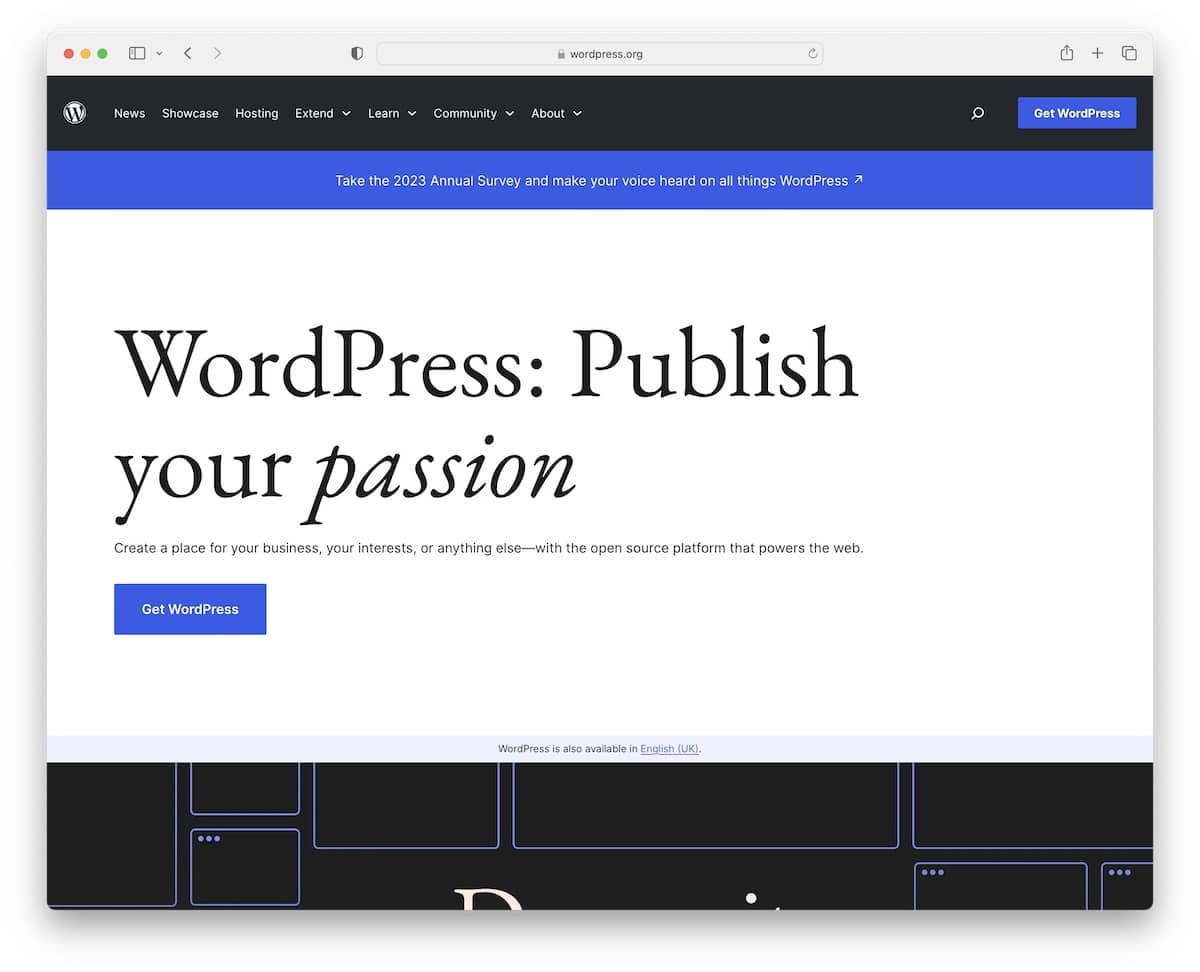
When it comes to open source CMS options, WordPress is a standout choice for its straightforward approach, catering to both beginners and professionals.
Here’s why WordPress is a top choice: It’s not just user-friendly; it’s incredibly intuitive.
You don’t need advanced technical skills to get your site up and running. The setup process is simple, and managing content is as easy as composing an email.
Looking for specific functionality or design? WordPress offers a vast repository of themes and plugins, allowing you to customize your site without needing to write code.
One of WordPress’s greatest strengths is its scalability. You can start with a small personal blog and scale up to a bustling online store, ensuring that your site grows with your ambitions.
And let’s not forget the community. With its enormous and active user base, finding solutions to issues is often as simple as a quick forum search. Regular updates also ensure that you’re always equipped with the latest web technologies.
WordPress provides a reliable and flexible foundation for virtually any online project.
Key Features of WordPress:
- Intuitive dashboard for easy navigation and content management, making it suitable for both beginners and advanced users.
- Over 50,000 plugins available to extend your site’s functionality effortlessly, including SEO tools, contact forms, and eCommerce solutions.
- Thousands of themes to quickly change your site’s design, many of which are customizable without coding.
- As the most popular CMS globally (see our WordPress statistics), it boasts a vast community with extensive forums, tutorials, and meetups for support and learning.
- Designed with search engine optimization (SEO) in mind, WordPress features clean, search-friendly code and plugins like Yoast SEO to enhance your site’s ranking.
Best for:
WordPress is ideal for individuals and businesses looking for a user-friendly platform that offers flexibility and customization options. It’s perfect for bloggers, small to medium-sized businesses, and online stores that want to leverage various plugins and themes to tailor their online presence.
Additionally, it is beneficial for those who value robust community support, providing assistance and resources for users at all skill levels.
Pricing: WordPress is completely free to use, though users need to pay for hosting, a domain name, and any premium themes or plugins they choose.
2. Ghost
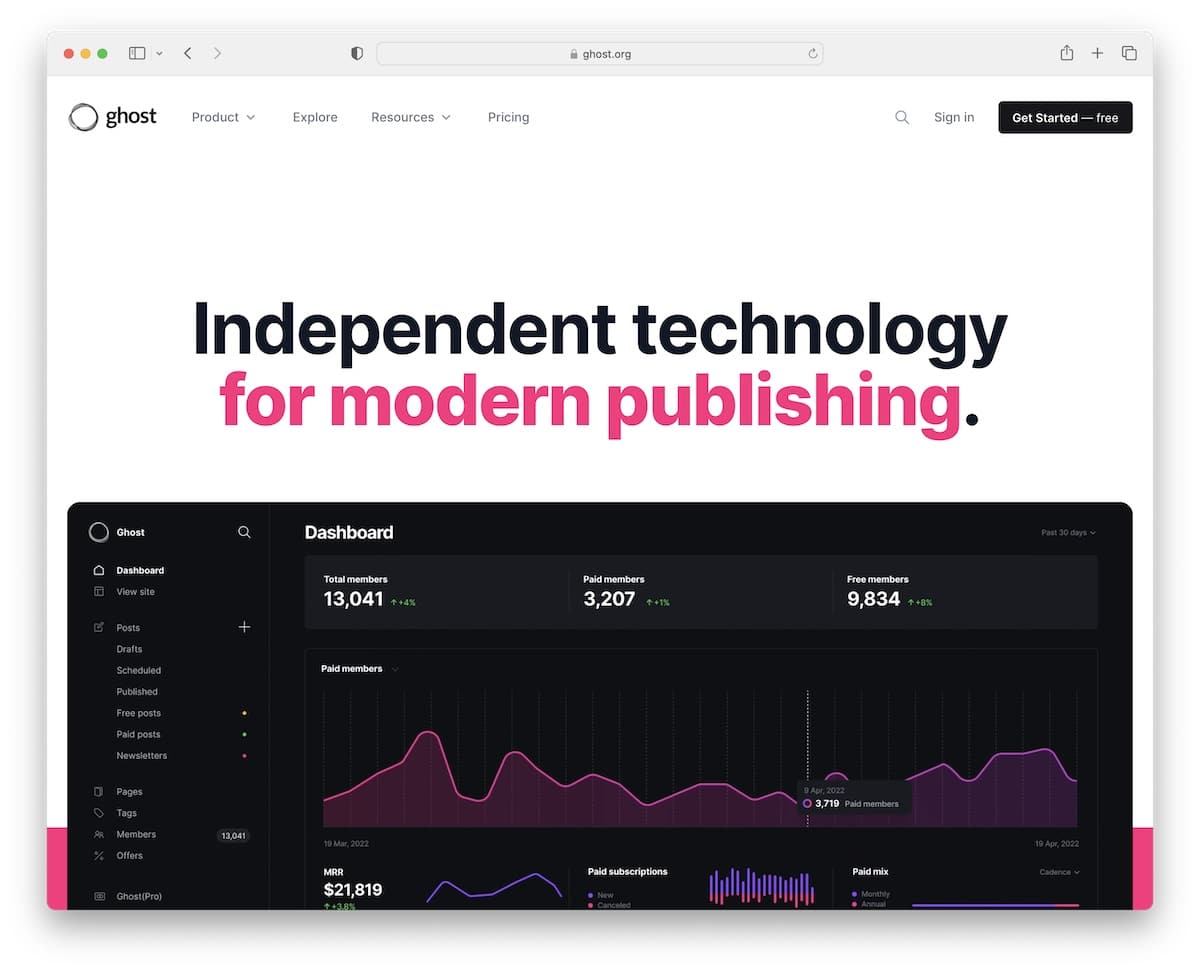
If you’re seeking a sleek, fast, and focused content delivery platform, let me introduce you to Ghost. It’s the minimalist and modern option in the open source CMS family.
Ghost is designed with one goal in mind: publishing.
It offers a clean, modern interface that gets your words onto the screen effortlessly. Ideal for bloggers and writers, Ghost provides a clutter-free workspace that emphasizes your content.
Built for speed and optimized for SEO right out of the box, the user experience with Ghost is exceptionally smooth—think of it like gliding on a freshly Zamboni-skinned ice rink.
Moreover, Ghost connects you with a community passionate about exceptional design and top-notch writing.
If you’re looking to turn readers into loyal fans, Ghost could be your perfect publishing partner. Ready to showcase your stories? Ghost is here to bring your ideas to life.
Key Features of Ghost:
- Writer-friendly editor allowing for quick formatting and intuitive writing without unnecessary tools.
- Built-in SEO settings and social media integration, eliminating the need for additional plugins and making audience reach more effective.
- Optimized for performance with Node.js, ensuring fast content loading to improve user experience and search rankings.
- Clean, minimalist interface that prioritizes content creation and presentation, offering a distraction-free environment for both writers and readers.
- Native support for membership and subscription models, enabling you to monetize your content and efficiently manage subscribers.
Best for:
Ghost is ideal for writers, bloggers, and publishers who prioritize a streamlined writing experience and efficient content management. Explore some live Ghost blogs and websites to see the creativity of its users.
Thanks to its integrated tools, Ghost is a top choice for individuals or organizations aiming to monetize their content through memberships and subscriptions.
It also attracts users who value speed, SEO, and a modern, uncluttered interface that lets their content shine.
Pricing: Ghost is free to download and use. However, you can opt for a paid managed solution starting at $9/month. Check out some cheaper Ghost hosting alternatives.
3. Craft CMS
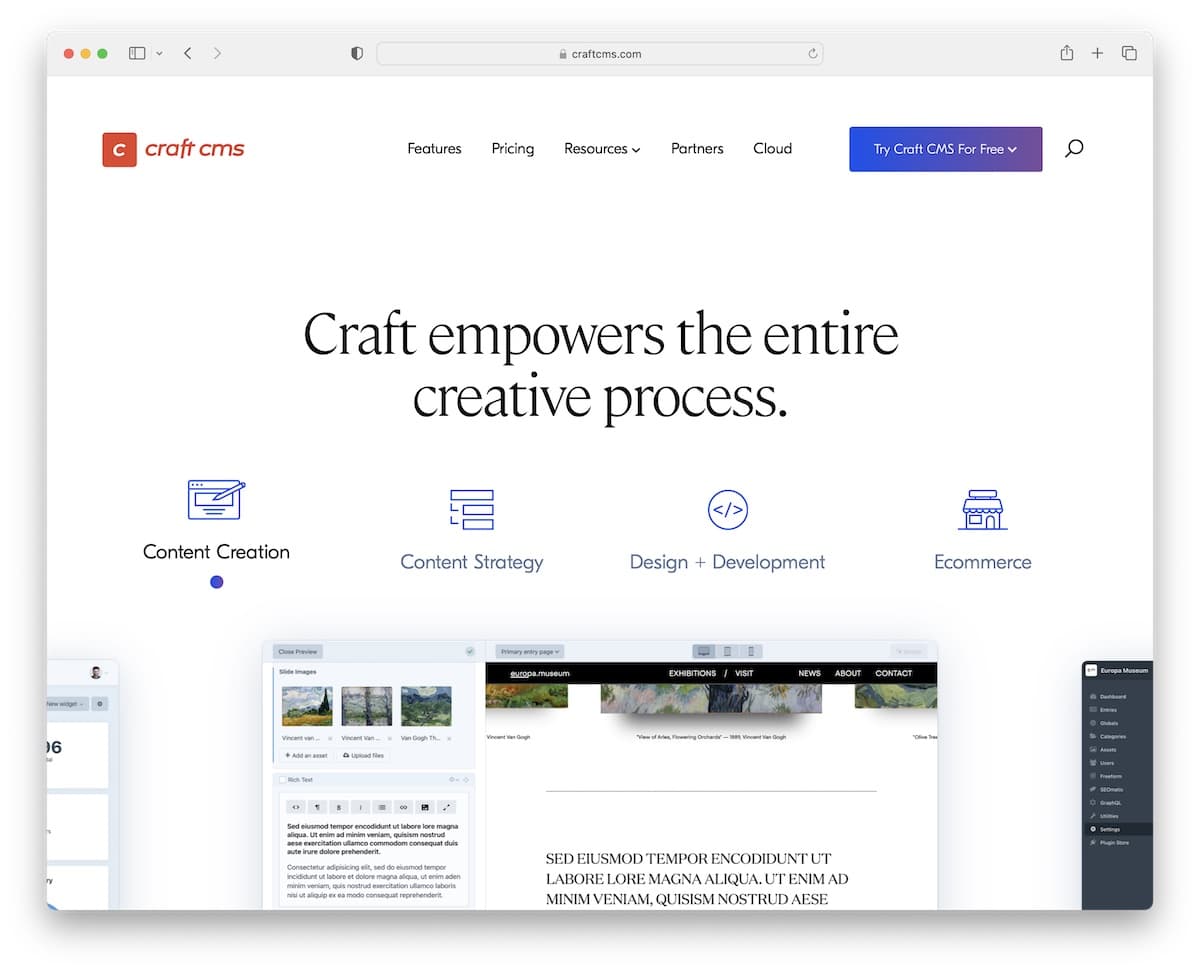
If you’re searching for a CMS that’s both powerful and user-friendly, look no further than Craft CMS.
Craft CMS excels in flexibility and precision, making it the ideal choice for developers and designers who want to create a tailored web experience.
What sets Craft apart? It treats your content with care, offering a sleek, intuitive control panel without unnecessary bloat—just the essential features to build a truly personalized website.
One standout feature is the live preview function, which lets you see exactly how your content will appear in real-time before making it public.
Craft CMS is perfect for businesses and creatives who want a custom-built website with exceptional management controls and modern standards.
Key Features of Craft CMS:
- Live preview feature allows you to see changes in real-time before publishing.
- Matrix field enables custom block-based content creation for flexible content modeling.
- Manage multiple websites with different languages and content structures from a single Craft CMS installation.
- Extend functionality with various plugins available in the Craft Plugin Store.
Best for:
Craft CMS is ideal for web developers and designers seeking a highly customizable and flexible content management system. It’s perfect for businesses and agencies that require a unique user experience and specialized functionality not typically found in off-the-shelf solutions.
Pricing: Craft CMS offers a free Solo plan with limited features and pro plans starting at $299 per project.
4. Grav

Welcome to Grav, the open source CMS known for its simplicity and speed.
Imagine Grav as a lightweight, high-performance sports car in the CMS world. It delivers fast performance without the bulk that can slow you down.
Grav doesn’t rely on a database, making installation straightforward and content management as simple as editing a text file.
What’s great about Grav? It’s designed to be highly intuitive.
With a user-friendly admin interface and modern architecture, Grav offers developers and designers the flexibility to create without constraints.
Ready to experience effortless web management? Grav is your solution for speedy, efficient content delivery.
Key Features of Grav:
- Flat-file CMS that doesn’t use databases, storing all data in files for speed and ease of setup.
- Markdown-based content creation, allowing quick and straightforward editing without advanced editors.
- Uses the Twig templating engine for flexible and modular template creation.
- Advanced caching system for high-speed content delivery and performance optimization.
Best for:
Grav is best suited for developers, designers, and content creators who prioritize speed, simplicity, and a lightweight CMS without database complexity. Its flat-file nature and markdown-based management make it a favorite among tech-savvy users who prefer a straightforward, file-based approach.
Pricing: The standard version of Grav is free to download and use.
5. Joomla
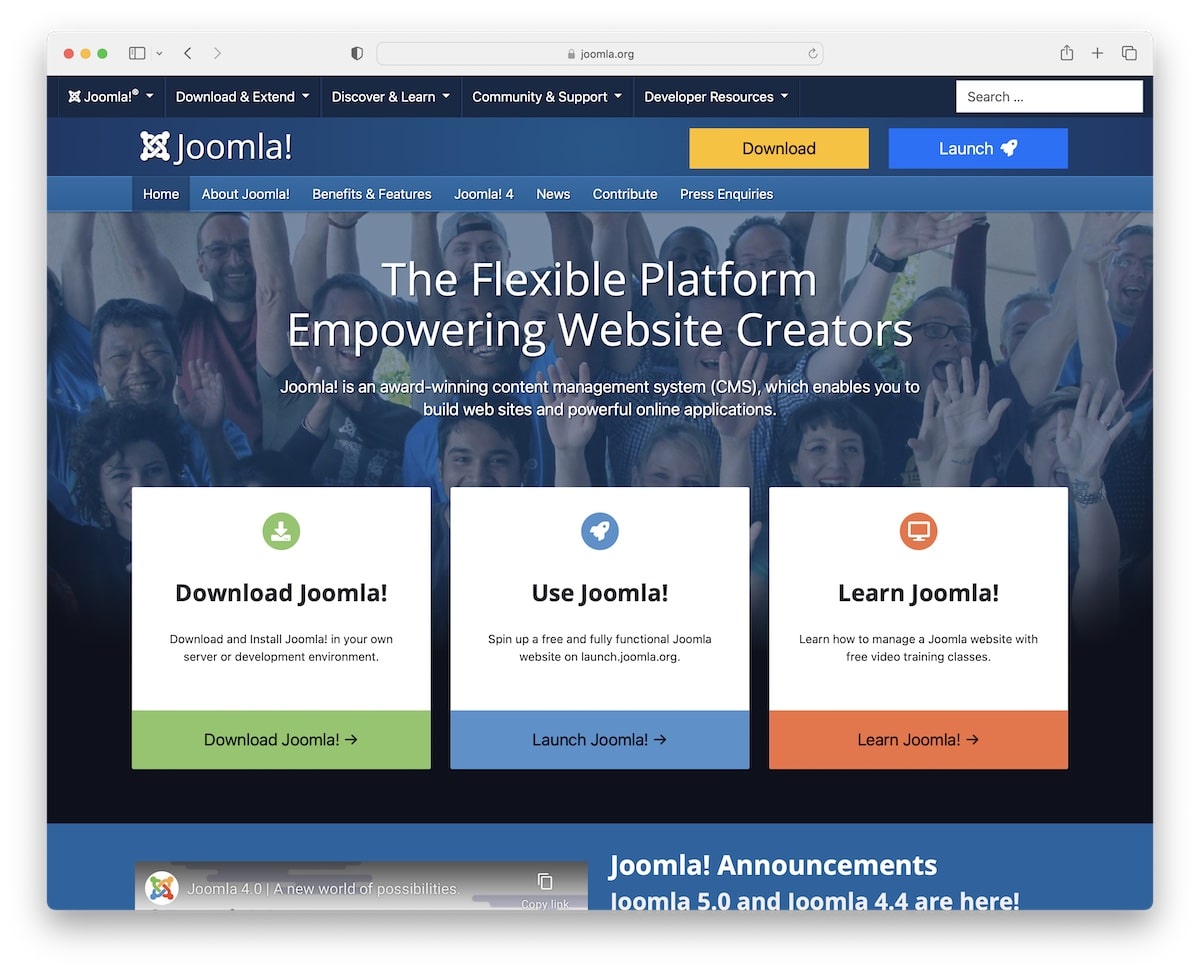
Joomla is a robust and versatile open source CMS that offers a balance of power and ease of use.
With Joomla, you get an advanced yet user-friendly platform that’s perfect for users who need more features than basic systems but prefer something less complex than the most intricate solutions.
Think of Joomla as the multi-tool of content management systems. Whether you’re building a personal blog, a small business site, or a large-scale eCommerce platform, Joomla provides the flexibility and power you need.
Its extensive library of extensions and easy-to-navigate backend make customization and management straightforward.
Plus, Joomla’s large and supportive community ensures you’ll have plenty of resources and assistance available.
Joomla strikes a perfect balance between functionality and simplicity, making it ideal for creating and managing feature-rich, attractive websites.
Key Features of Joomla:
- Comprehensive user management system with customizable user groups and permissions for detailed access control.
- Extensive range of Joomla templates and extensions to enhance and expand your site’s functionality.
- Easy installation and customization of Joomla templates without needing to modify code.
- Mobile-friendly and optimized for search engines straight out of the box.
Best for:
Joomla is ideal for small to medium-sized businesses, non-profits, and organizations that require a structured website with various content types. It’s well-suited for users with some web development knowledge who want a feature-rich platform with room to grow.
Pricing: Joomla is completely free to use. However, users will need to pay for hosting, domain registration, and any premium templates or extensions they choose.
6. PrestaShop

Discover PrestaShop, the powerful open source CMS designed specifically for eCommerce.
Why choose PrestaShop? It simplifies the process of setting up and managing an online store, offering an intuitive interface that reduces technical stress.
With a wide array of customizable PrestaShop themes and modules, you can tailor your store’s appearance and functionality to meet your specific needs.
Whether you’re starting your first online store or expanding your existing eCommerce operations, PrestaShop provides the tools to make your business thrive.
Explore additional options with our list of the best eCommerce CMS solutions.
Key Features of PrestaShop:
- Comprehensive product management system with features like product comparisons, wishlists, and layered navigation.
- Supports multiple languages and currencies to provide a localized shopping experience for a global audience.
- Built-in marketing tools, including promotional offers, coupon codes, and email marketing integrations.
- Detailed analytics and reporting to gain insights into sales, customer behavior, and more for data-driven decision making.
Best for: PrestaShop is ideal for entrepreneurs and businesses of all sizes seeking an effective eCommerce platform with flexibility for customization. It’s a user-friendly solution for those wanting a cost-effective and feature-rich online store setup.
Pricing: PrestaShop is free to use, with no hidden fees. However, you will need to pay for hosting, domain registration, and any premium design elements or modules.
7. Bolt

Bolt is not just another open source CMS; it’s built on Symfony 5, offering a powerful and flexible foundation for your website.
With Bolt, you benefit from the robustness of the Symfony framework, which makes extending your website’s capabilities straightforward and efficient. The use of Twig for templating ensures that creating and managing your site’s layout is both flexible and secure.
One of Bolt’s standout features is its built-in internationalization, allowing you to reach a global audience with minimal effort. Its RESTful and GraphQL APIs enable seamless integration and extension.
Additionally, Bolt’s content management features include dummy content generation for quick setup and fully licensed rich content editors like Article and Redactor, enhancing content creation and editing.
Key Features of Bolt:
- Built on Symfony 5, offering a robust and high-performance foundation with extensive scalability through Symfony extensions.
- Utilizes Twig templating engine, providing a flexible, fast, and secure way to manage your site’s design and layout.
- Supports multilingual content management, enabling easy localization and global reach for your website.
Best for: Bolt is perfect for developers and web designers who seek a combination of straightforward content management with the robust capabilities of a Symfony-based application. It’s ideal for those who need design flexibility without the complexity of larger systems.
Pricing: Bolt is free to use, whether for personal projects or client websites.
8. OpenCart

Looking for an eCommerce CMS that makes setting up and managing your online store effortless? Meet OpenCart, the open source platform designed for seamless online shopping experiences.
OpenCart is renowned for its user-friendly interface, which simplifies product, order, and customer management. Its extensive selection of OpenCart themes and extensions allows you to customize and enhance your store’s functionality easily.
With OpenCart, you get to focus on growing your business while enjoying a vibrant community of merchants and developers ready to support your journey.
Key Features of OpenCart:
- Intuitive admin dashboard for effortless management of products, customers, and orders.
- Ability to manage multiple stores from a single admin interface, each with its own design, products, and customers.
- Built-in SEO tools to optimize product pages and improve search engine visibility.
Best for: OpenCart is ideal for small to medium-sized businesses seeking a straightforward, no-frills eCommerce solution. It’s also well-suited for managing multiple online stores with its multi-store management features.
Pricing: OpenCart is free to use, with a Cloud service option starting at $59 per month for additional features and support.
9. Concrete CMS
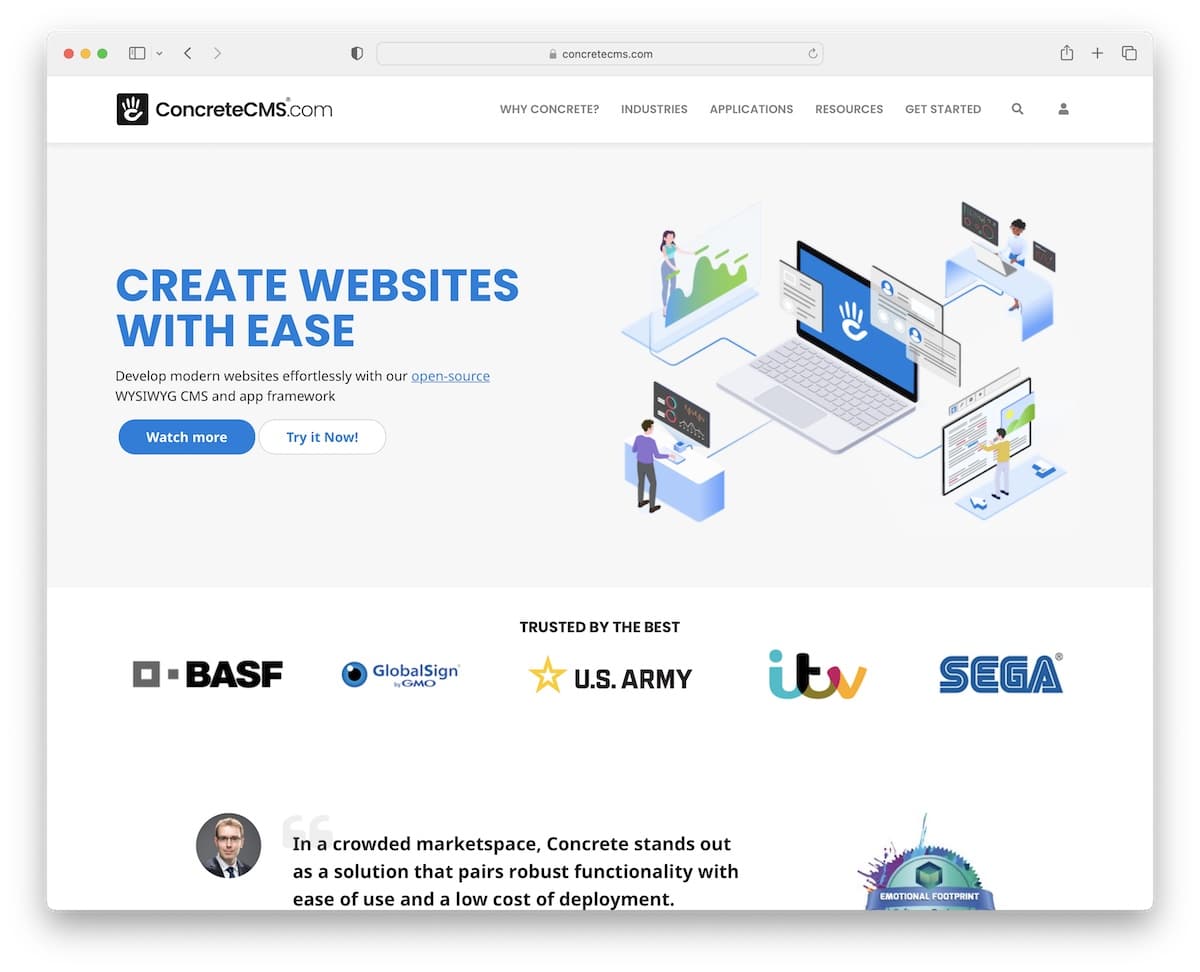
Concrete CMS is a powerful and user-friendly open source CMS designed for creating and managing robust websites with ease.
With Concrete CMS, you can leverage a WYSIWYG editor and drag-and-drop functionality to build your site without needing to code. The in-context editing feature allows you to see exactly how your changes will look in real-time, simplifying the design process.
Extend your website’s capabilities effortlessly with a wide range of add-ons and themes. Concrete CMS ensures your site looks great on any device with its mobile-optimized, responsive design features. The Style Editor provides easy customization to achieve a tailored look.
For marketing and engagement, Concrete CMS offers comprehensive tools for form creation, data collection, integrated reporting, and blogging, helping you connect with and engage your audience effectively.
Security is a top priority with Concrete CMS, and it provides reliable support and a vibrant community to assist with any issues.
Key Features of Concrete CMS:
- Intuitive WYSIWYG editor for direct on-page editing, streamlining the web design process.
- Modular building with reusable stacks, templates, and blocks for a consistent and responsive site design.
- Comprehensive tools for creating forms, surveys, and collecting data, along with integrated reporting for analysis.
- Advanced user management and permissions settings for detailed control over site access and editing capabilities.
Best for: Concrete CMS is ideal for businesses and organizations seeking a robust yet easy-to-use CMS for managing their online presence without requiring extensive technical knowledge. Its intuitive editing and flexible design options make it perfect for users who prefer real-time website creation and updates.
Pricing: Concrete CMS is free and open source. Optional paid plans start at $16 per month and include hosting services.
10. Drupal
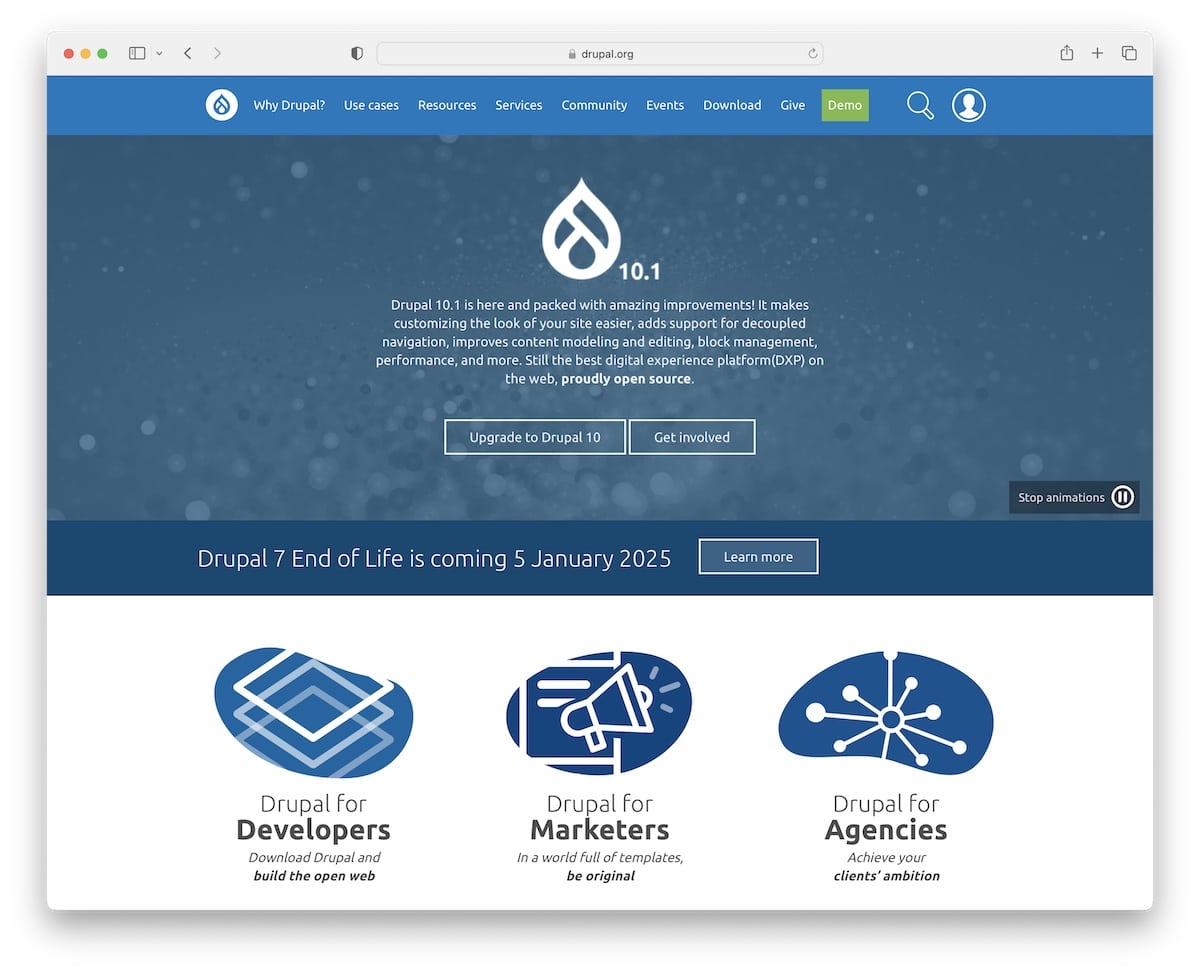
Drupal is a powerful and versatile open source CMS known for its emphasis on delivering exceptional digital experiences. This platform excels in security, scalability, and multilingual support, making it a top choice for complex and high-traffic websites.
With Drupal, your site benefits from a fortress-like security system that keeps user data safe and sound. Whether your traffic spikes or your site needs to expand, Drupal scales seamlessly to meet demand without compromising performance.
Dreaming of reaching a global audience? Drupal’s robust multilingual capabilities make it easy to translate content and engage users worldwide. The platform is also committed to accessibility, ensuring that all users, regardless of ability, can interact with your content effectively.
Drupal is a marketing powerhouse, offering advanced automation and personalization features that enhance user experiences and engagement. It enables you to manage content across multiple platforms and channels, delivering it as a service to meet diverse needs.
Pro tip: Enhance your site quickly with these Drupal templates to save time and boost your site’s functionality.
Key Features of Drupal:
- Strong security features with an active community dedicated to identifying and fixing vulnerabilities, making it a reliable choice for secure websites.
- Scalable performance optimization for handling high traffic and complex data structures, ensuring your site remains fast and responsive.
- Commitment to web accessibility standards, providing content access to users with disabilities.
- Sophisticated personalization capabilities, leveraging user data to create tailored content experiences for a more engaging user journey.
Best for: Drupal is best suited for users needing a highly customizable and scalable CMS capable of managing complex content structures and workflows. It’s ideal for those who prioritize robust security and require advanced features to create personalized and multilingual user experiences.
Pricing: Drupal is a free open-source CMS. However, as with other open-source tools, you will need to cover costs for hosting, domain names, and any premium features or services.
11. Microweber

Discover Microweber, an innovative open source CMS that makes website creation as simple and enjoyable as playing with building blocks. With its groundbreaking Live Edit feature, you can make changes and see updates in real-time, no technical skills required.
Microweber’s intuitive admin panel provides a seamless experience for managing your site. From real-time stats and dynamic page creation to effortless content management, it’s designed to enhance your creative process.
Looking to launch an online store? Microweber offers straightforward product uploads, efficient order management, and a comprehensive suite of eCommerce tools to boost your business.
For bloggers, Microweber simplifies article management, comment moderation, and social sharing. Its extensive modules and API integrations allow for easy expansion and functionality upgrades.
Key Features of Microweber:
- Real-time editing experience, allowing you to see website changes instantly without switching between editing and preview modes.
- Preset layouts and customizable modules that enhance website functionality and meet specific needs.
- Automatic optimization for a smooth user experience across all devices, including mobile.
- Powerful admin panel with tools to monitor traffic, orders, and feedback in real-time.
Best for: Microweber is perfect for entrepreneurs, small business owners, and freelancers seeking an intuitive platform for creating and managing a professional online presence without needing technical expertise. Its live editing, drag-and-drop functionality, and comprehensive eCommerce solutions make it an ideal choice for quickly launching and managing your website.
Pricing: Microweber offers a free plan for small projects. For more advanced features, you can choose between two premium plans: Personal ($8/month) and Business ($20/month).
12. Umbraco CMS

Welcome to Umbraco CMS, where content management meets cutting-edge technology, offering a robust platform for editors and developers alike. With Umbraco, you get the flexibility to create a custom-fit website tailored to your needs.
Enjoy a world-class content management experience with Umbraco’s intuitive interface, which simplifies publishing, scheduling, and managing content. Its media library allows for seamless uploading and editing of images and videos.
Built on the powerful .NET framework, Umbraco is a developer’s dream with its advanced APIs, service layer for scalability, and Models Builder for efficient content rendering. Its composable DXP (Digital Experience Platform) approach makes integrating various tools and platforms straightforward.
Join the Umbraco universe where content is king, and the possibilities are endless. Whether you’re looking for a sophisticated content management system or a versatile development environment, Umbraco has you covered.
Key Features of Umbraco CMS:
- Intuitive content management interface that allows for easy content publishing, scheduling, and management.
- Support for multiple languages to cater to a diverse global audience across various channels.
- Robust API, flexible content models, and extensive customization options with the latest web development technology.
- Seamless integration with a wide range of third-party tools and platforms for a flexible DXP experience.
Best for: Umbraco CMS is ideal for those seeking a highly customizable and scalable open-source CMS that combines content management efficiency with developer flexibility. It is well-suited for users who want a user-friendly interface for content creators and robust .NET framework capabilities for building feature-rich websites and applications.
Pricing: Umbraco CMS is available as a free open-source version. For additional features and benefits, you can opt for the paid Umbraco Cloud version.
What Is The Best Open Source CMS?
Among the numerous open source CMS solutions available, three standout options are WordPress, Ghost, and Craft CMS:
- WordPress is renowned for its vast user base and ecosystem, providing thousands of themes and plugins that make it highly versatile. Its user-friendly interface and extensive community support make it a top choice for a wide range of websites, from blogs to eCommerce.
- Ghost excels for writers and publishers who need a fast and focused content creation experience. With its streamlined, markdown-based editor and built-in subscription model, it is perfect for professional publishing with a minimalist approach.
- Craft CMS is ideal for designers and developers looking for a tailored content management experience. Its flexible templating, fine-grained control over content and user permissions, and user-friendly control panel make it a great choice for bespoke website solutions.



